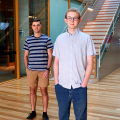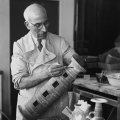JOINT MEDIA STATEMENT
UQ health researchers have joined with the directors of Queensland’s leading medical research institutes to speak out against significant funding cuts to medical research foreshadowed in the upcoming Federal Budget.
The National Health and Medical Research Council (NHMRC), the peak body for funding medical research in Australia, is under threat to lose millions. Current funding for medical research represents less than 2 percent of federal health expenditure. [1]
Directors from the Queensland Institute of Medical Research (QIMR); The University of Queensland’s Institute for Molecular Bioscience (IMB), Diamantina Institute (UQDI), Queensland Brain Institute, and Faculty of Health Sciences; Mater Medical Research Institute; QUT’s Institute of Health and Biomedical Innovation (IHBI); Wesley Research Institute (WRI) and the Queensland Children’s Medical Research Institute (QCMRI) urge the Australian Government to take a long-term view and at least maintain current investment in medical research – the health of all Australians depends on it.
Protecting medical research funding is an investment in the future health of Australians. Medical advances have not only saved lives but have reduced healthcare costs, attracted international investment and built new industries.
Not only is medical research an investment in our health but it also delivers a positive economic return to the country. Every $1 invested in Australian health R&D, returns on average $2.17 in health benefits. [2]
National Health and Medical Research Council funding supported more than 8,000 jobs in Australia in 2010. Significant budget cuts will force our best scientists overseas to work in countries that value and support medical research, decreasing our ability to respond to the specific healthcare needs of Australians.
Queensland has worked hard to establish itself as the Smart State and a leader in health and medical research – reduced funding for medical research will risk losing our best researchers and jeopardising the future health of all Australians.
[1] Australian Institute of Health and Welfare, 2010.
[2] Access Economics, 2008.
Health and medical research funding cuts fact sheet
• A cabinet leak has confirmed that the Government is planning to cut funding for to Australia’s medical research in the upcoming budget. This will come from the National Health and Medical Research Council’s (NHMRC) budget, the peak body for funding medical research in Australia.
• The NHMRC currently commits around $700 million each year to fund health and medical research.
• A cut will have an effect on all Australians. It will risk:
o future access to health benefits
o reducing Australia’s spending on health
o the long-term investment made by previous governments, as medical research takes years and sometimes decades to come to fruition
o retaining Australia’s best scientists, which will be detrimental to our future research capacity
o medical research jobs – the National Health and Medical Research Council (NHMRC) directly supported 8000 jobs in 2010.
• The amount of money available to award to new projects each year is less than a third of the NHMRC’s total budget, as project grants last for three years on average.
• Last year, the NHMRC committed to around $430 million for project grants. Only 20% of applicants were successful in having their projects funded. Given the number of applicants has risen by about 10 percent, and the costs per grant will also have risen, the success rate for funding of new grants may drop to as low as 14%. This means only 14% of the health and medical projects that researchers need to carry out in order to advance medical knowledge and benefit the health of all will be able to go ahead.
• Australian patients are usually the first to benefit from Australian discoveries.
• Medical research improves the long-term health outcomes of all Australians. Reduced funding will decrease our capacity to respond to the unique healthcare needs of Australians
• Medical research also has an economic benefit to the country. Every $1 invested in Australian health R&D sector returned, on average, $2.17 in national economic development (Access Economics 2008).
• Australian research produced: the bionic ear, the heart pacemaker, the humidicrib, the medical ultrasound, the cervical cancer vaccine, to name a few.
• The entire budget of the NHMRC is currently:
o less than 2% (1.8%) of the 2008/2009 total budget of the Department of Health and Ageing of $38.38 billion
o less than 1% (0.93%) of the estimated cost of the Australian Broadband Network ($43 billion)
Many Queensland research projects are funded by the NHMRC. A significant budget cut means projects like these may not be funded in the future:
• A project sequencing the genomes of 500 pancreatic and ovarian cancers to compare the genetic differences between normal tissue and tumours (IMB)
• The long-term study of the human papilloma virus (HPV) and Professor Ian Frazer’s development of the first cervical cancer vaccine, Gardasil (The UQ Diamantina Institute)
• The therapeutic development of a novel drug for spinal cord injuries (QBI)
• Exploring the best rescue strategies for premature babies, as well as combating super bugs and antibiotic resistance (UQ Health Sciences)
• Projects designed to prevent acute exacerbations of asthma in children and prevention of chronic suppurative lung disease (QCMRI)
• Research at the QIMR and the University of Queensland into the human genetic disorder ataxia-telangiectasia (A-T), a debilitating disease of childhood, has been instrumental in the establishment of a clinic at the Royal Children’s Hospital for the treatment and management of the disorder.
• Life saving immunotherapy trials for advanced melanoma patients (QIMR)
More information can be found on the Discoveries Need Dollars website: http://www.discoveriesneeddollars.org/news_links
Issued by
Media Contacts:
Queensland Institute of Medical Research (QIMR)
Sarah Tennant, Science Communication Manager
07 3362 0291 or 0458 650 200
sarah.tennant@qimr.edu.au
The University of Queensland’s Institute for Molecular Bioscience (IMB),
Bronwyn Adams, Communications Manager
07 3346 2134 or 0418 575 247
b.adams@imb.uq.edu.au
Queensland Brain Institute
Denise Cullen, Executive Communications Officer
07 3346 6434
d.cullen2@uq.edu.au
Diamantina Institute
Caroline Davy, Communications Manager
07 3176 6623
c.davy@uq.edu.au
UQ Faculty of Health Sciences
Marlene McKendry, Communications Manager
07 3346 4713 or 0401 996 847
m.mckendry@uq.edu.au
Mater Medical Research Institute
Jacqui Hayes, Senior Public Affairs Officer
3136 2378
Jacqueline.hayes@mater.org.au
QUT’s Institute of Health and Biomedical Innovation (IHBI)
Ross Young, Executive Director
rm.young@qut.edu.au
Wesley Research Institute
Jason Davidson, Marketing Manager
07 3721 1508
jdavidson@wesleyresearch.com.au
Queensland Children's Medical Research Institute
Marcus Engeman, Chief Operating Officer
07 3636 1263
marcus.engeman@qcmri.org.au
.jpg)











